Are the humanities dying? If so, who or what is killing (killed) them? If not, how could we revive them?
Let’s investigate.
So, I saw this in the New York Times, and when a story like this hits the Times, it’s usually several months old, having already percolated through the higher education press for some time.
Regular readers may recall that I covered the problems plaguing higher education writ large - problems which are significantly dispositive when thinking about what’s going on with the humanities in academia - back in August.
I’m not Nostradamus. Paying attention to this stuff is just part of my job.
Anyway, let’s accept that the academic humanities are dying. Majors are down, institutions are cutting back, and according to Caitlin Flanagan:
You know someone is really in touch with the youth of today when they make a Bazooka Joe reference. Flanagan is also a believer in the pervasiveness of the “woke mind virus” coming out of America’s universities. Flanagan is not clear on how the English major is simultaneously poisoning minds with the woke mind virus and being rejected by young people because of its soullessness, but never mind, clearly something is awry.
In reality, the English major has been on the wane for decades. English and other humanities majors have been steadily declining since before I started college, primarily replaced by business majors and computer science. In essence, a niche field (computer science) exploded, while the all-purpose liberal arts college degree that led into figuring out what to do with your life after college was replaced by specialized majors.
So, yes, humanities majors are declining and being defunded and are under explicit attack like from the government official in Mississippi featured in the Times article who wants to get rid of anthropology because those majors move away from the state.
The move to turn post-secondary education into vocational training for white collar jobs isn’t new, is unfortunately bipartisan, is looking impossible to reverse under the present system, and also doesn’t make any sense on its own logic. The overwhelming amount of evidence suggests that humanities majors do quite well in the employment market, so the myth of unemployed history/English/anthropology majors is just that, a myth. To the extent that wages for those with humanities degrees lag behind others, much of it is structural. For example, the “teacher wage penalty” (most teachers get some sort of humanities degree) reaches a new all-time high, year-after-year. Teachers now make almost 25% less than others with comparable degrees.
As a guy with three English degrees, I think accepting the myth that a humanities degree is “useless” is incredibly short-sighted and counterproductive thinking, not because I have a romantic attachment to my field of study, but because my humanities education that trained me to think critically has allowed me to adapt to our ever changing world.
(I wrote my first public defense of the utility of my English degrees in 2013. Not much has changed in public perception since. I’m definitely not Nostradamus because I think people actually listened to him.)
The same skills that helped me write a 20 page explication of Gerard Manley Hopkins’s “God’s Grandeur,” proved useful to drafting quantitative questionnaires as a market research analyst. I’ve proved highly trainable because I was educated.
But also, we are more than our ability to earn money, right?
Right?
If you ask me - and no one did - it was and is a mistake to rely on academia as the repository of humanistic pursuits for all. There is a disconnect in mission between the kind of work academics do in the humanities and the kind of stuff that most people desire when they intersect with the humanities. Flanagan's pique over postmodern theory that is now at least a generation past its prime misses that for an academic to make their bones in academia, they must develop an approach judged sufficiently novel. It’s like a shark. It’s got to keep swimming or it dies.
Does this lead to some weird stuff that regular folks don’t understand or care about coming out of our universities? Of course, that’s the point!
We also shouldn’t confuse students shying away from majoring in the humanities with an overall disinterest in the kinds of thinking and study that the humanities require. Again, the reasons why students choose their majors are overwhelmingly related to structural issues and student perceptions around a degree “paying off.” The biggest reason people don’t pursue any post-secondary degree is cost. Make public higher ed tuition free and you’ll see plenty of people run towards their interests.
If you really want to pin the blame for these declines on any culprit, take aim at the real cause: Capitalism. It’s the same cause that led to the dissolution of the Printers Row book section at the Chicago Tribune where the namesake column for this newsletter was born. The Tribune was always a profitable paper, but it was not profitable enough for the world of finance and private equity, which looks at stuff people need and wonders how it can squeeze more money out of it before discarding the husk.
Your dentist, your veterinarian, your ophthalmologist, all kinds of other local businesses have been taken under corporate ownership and been worsened or even ruined. Two books on this phenomenon were released almost simultaneously earlier this year, not coincidentally sharing a word in their titles.
Under the logic of capitalism, the only justification for the continuance of an activity is economic. The universities cutting humanities are being advised by consultants who tell them what the market “demands.”
What the market demands is not the same as what people desire.
I’ve gotten off track. Back in 2016, looking at that year’s bad news for the humanities in academia, I declared at Inside Higher Ed that “the humanities would never die,” but that it seemed likely that academia would not continue to be their home. I agree with 2016 me even more than I agreed with me in 2016. It’s not that I’m giving up on the amazing potential of post-secondary education to open people to becoming more capacious versions of themselves, but for the humanities to survive it’s going to take more concerted efforts outside of academia.
It is possible to “do” the humanities in ways that accommodate the challenges of capitalism. Many of you likely have heard Mike Duncan’s history podcasts, or read one of his books, Hero of Two Worlds: The Marquis de Lafayette in the Age of Revolution and The Storm Before the Storm: The Beginning of the End of the Roman Empire. The dude bootstrapped his career using his B.A. in history and working as a fishmonger as he launched his podcast.
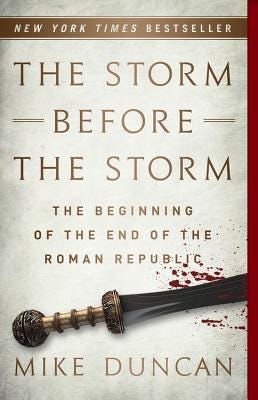

Zena Hitz, author of a book that persuasively extols the virtue of the humanities, Lost in Thought, has started The Catherine Project, a non-profit that provides people with free access to discussion groups led by subject matter experts focused on (literally) the classics.
So yes, work in the humanities can be bootstrapped, but let’s not kid ourselves that this is some kind of route to maintaining broad access to humanistic experiences for all.
There’s a wonderful event going on in my hometown over the next couple of weeks, the Charleston Literary Festival, started in 2017 in this relatively small city that will bring writers like Lorrie Moore, Claire Keegan, Richard Ford, Adam Gopnik, A.O. Scott, Rebecca Makkai, and Jonathan Eig to town for live events, most of which will sell out. The festival is run on donations, staffed by volunteers. It’s awesome, and yet, by necessity it is pitched to the well-heeled types who are willing and able to fork over $25 for tickets to an event, $100 for the opening night party, or $625 for an all-access pass.
There’s discounts available and some coordination with the College of Charleston makes it accessible for students, but the humanities cannot be reserved for the people who can afford it.
Increasingly, the humanities are framed - by politicians, by higher ed administrators, even by parents worried about the fates of their children - as a luxury item. To allow these trends to continue to their logical end would be a tragedy. Truly.
I wish I knew why people and systems orient toward what the market demands rather than what they desire.
Links
My Chicago Tribune column this week is a little late going online so I can’t link it directly, but this is where all the columns are housed. As I recall, I did some musing on the most expensive used books sold through AbeBooks.com last quarter.
Roxane Gay, who has a new collection of her essays out answered Elle magazine’s “shelf life” questionnaire, generating a number of recommendations.
This is a neat story with cool visuals from the Washington Post. Stephen King gives readers a tour of his home library and collection of books.
The Chicago Review of Books has their 12 “must reads” for November. So much pressure!
At his newsletter,
tells a fascinating story about the thinking that goes into deciding a book’s “trim” size.For you writers out there, McSweeney’s has announced the return of its column contest. For however many years we used to do it, I was in charge of this process, and it’s a fantastic way to jumpstart the idea you have in your head and find an audience. Lots of people enter, but some people must also win! (I have nothing to do with it anymore, other than as a sounding board to the fine people in charge now.)
I found this recent piece at McSweeney’s delightfully strange: “Sex Ed in Florida is Now Just a Video of Ron DeSantis playing ‘The Lime in the Coconut” Song on the Bongos.”
Recommendations
1. Flight by Lynn Steger Strong
2. Eleanor Oliphant is Completely Fine by Gail Honeyman
3. A Nearly Normal Family by MT Edvardsson
4. Tomorrow, and Tomorrow, and Tomorrow by Gabrielle Zevin
5. Zero Days by Ruth Ware
Julie J.
I feel like Lisa Lutz’s How to Start a Fire is really under-appreciated. She’s more known for her suspense novels and her Spellman’s detective series, but this novel of women relating to each other and the world is quite moving.1
You know what I’ve really been enjoying lately? The Cricket World Cup. I dig a sport where the U.S. doesn’t compete because my jingoism reflexively kicks in, and as far as I know the U.S. has never made the Cricket World Cup. Games stream from the ESPN app in the morning here and there’s something about the rhythms of the action that’s very soothing, but dramatic at the same time.
I’m hoping by the time the finals roll around next week that I’ll have figured out the scoring.
Please enjoy your extra hour, those of you who have fallen back today.
John
The Biblioracle
All books linked throughout the newsletter go to The Biblioracle Recommends bookstore at Bookshop.org. Affiliate proceeds, plus a personal matching donation of my own, go to Chicago’s Open Books and the Teacher Salary Project, which is advocating to establish a federal minimum salary for teachers of $60,000 per year. Affiliate income is $259.50 for the year.




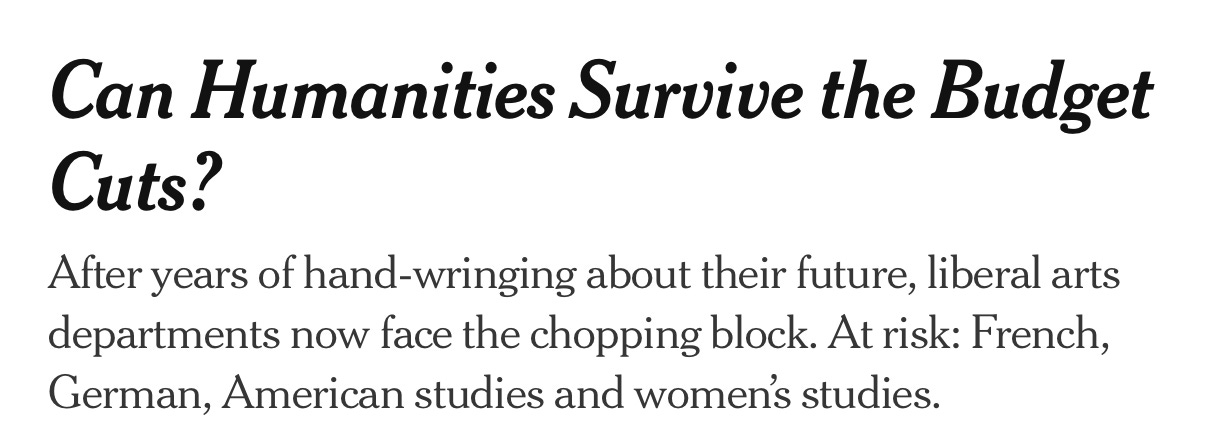
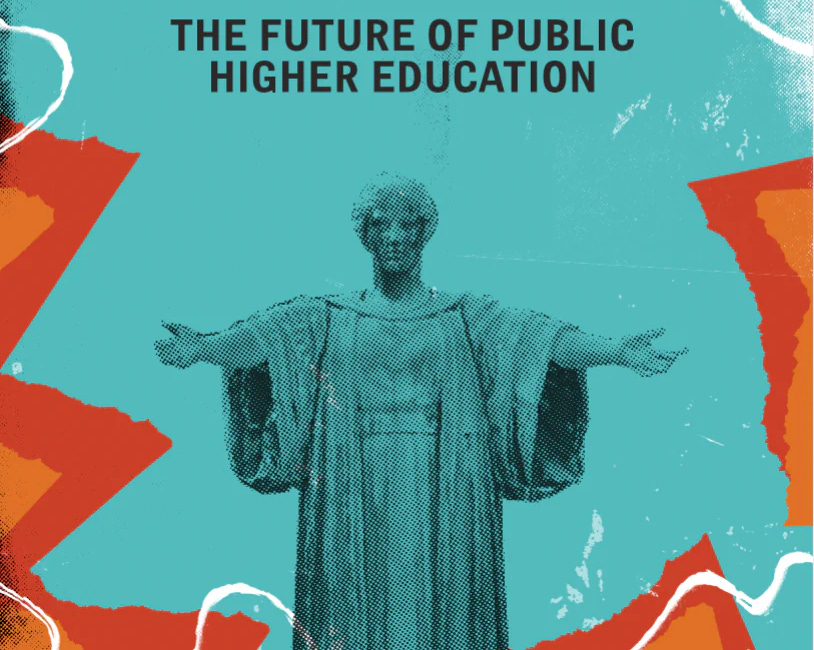
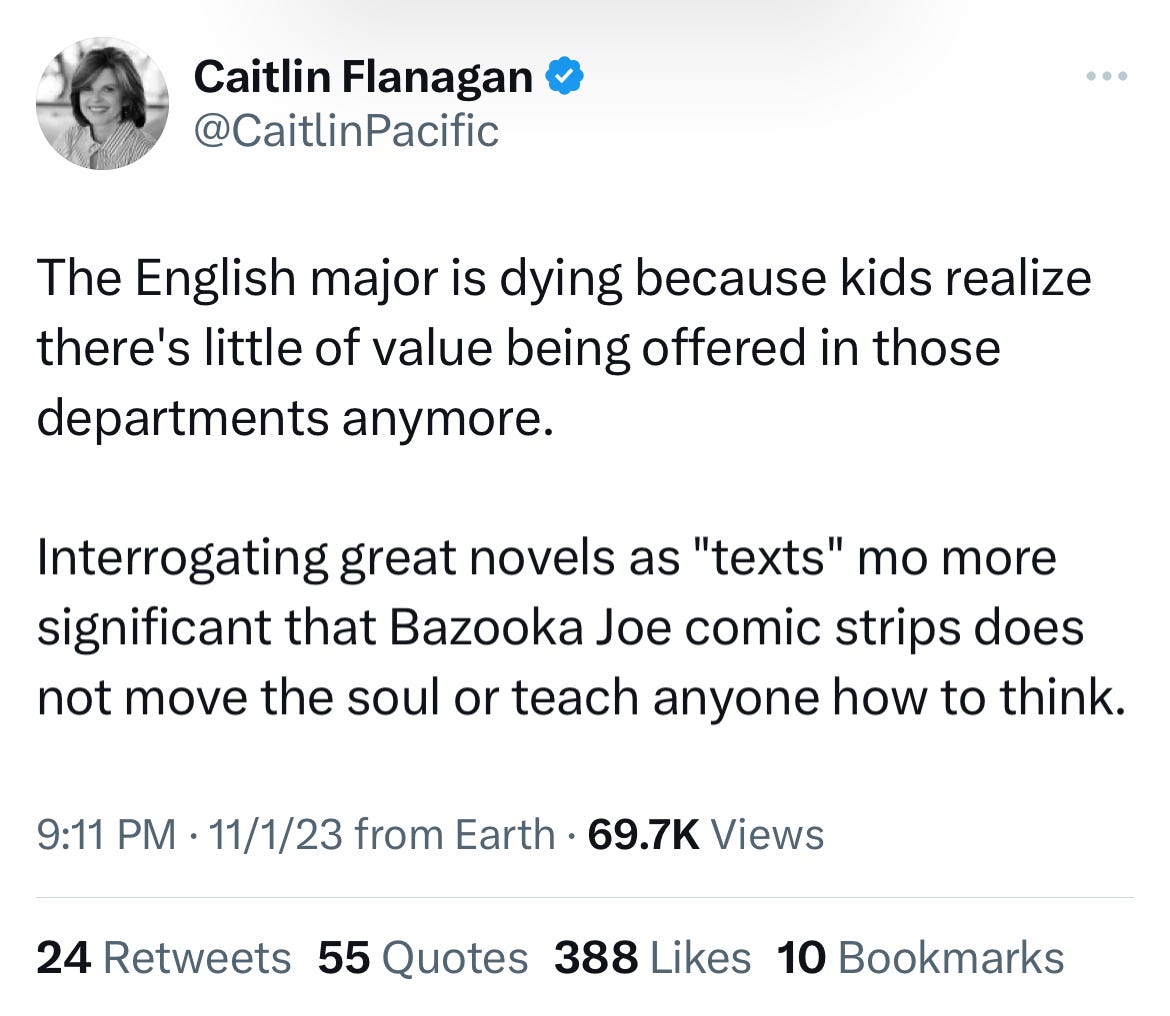
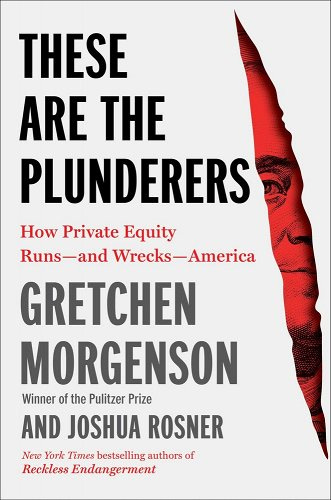
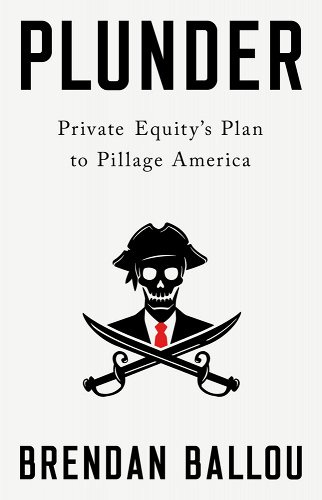
I remember when they wanted to close all smaller departments in the university of my hometown (Hamburg, Germany) with the reason you named: Geting rid of costlier departments, streamlining the university. But they didnt call it that, they said it was because they want more students finding work in those field.
When someone pointed out that no1 on the shopping block was finnugristic which had the previous year a HUNDRED PERCENT employmenmt rate by graduates in finnish businesses, they basically said "Well, still" (I left shortly afterwards so I dont know what happend in the end)
That was in the 90s.
Universities are expansive, and they allow for critical thinking. Thats not high on the priority list on conservative politicians.
You make really valid points! I may have said this as a comment on one of your other newsletters-- or quite possibly one of the many other newsletters I read, but most people view college as a way to get a job. And find no value in degrees that don’t directly lead to a job, i.e. the social sciences and humanities. Neither of my parents have college degrees, but my going to college was never a question, but an expectation. Because an education would lead to a good job. So I didn’t have the pressure to major in something that would lead to a job, and I didn’t treat college that way. I ended up with a BA in Anthropology, because it was the one discipline that was interdisciplinary! I could do all the science/bio stuff I liked without the math and chemistry, and also all the history I enjoyed with archaeology. I subsequently went on to earn an MA in anthropology as well! I always viewed college as teaching me and everyone else, though my peers vehemently disagreed-- most of whom were science/engineering/math majors-- that we were all learning the same thing, how to read, how to write and how to think critically. Vastly important skills no matter what career you choose. Skills, I realize, that my parents don’t quite have, with their high school educations. I never had a directly related anthropology job-- which did pose a problem in job interviews, and still does, as people assume that I should be a professor, or locked away in a lab doing research-- things I never wanted to do! But any real job skills, I learned on the job. In this day and age, where you can google anything, watch a you tube video showing you how to do something, college shouldn’t be about finding a job, but learning how to be in the world. Grad school is for practical job skills. You don’t need to have a BA in biology to go to med school-- you go to med school to be a doctor. That’s where you learn the skills for that, and frankly that’s what you do at the hospital! You learn to be a doctor not in college, but on the job. Like most jobs. So really, we all need to get over our hangups with using college as the means to finding a job, or the means to learning how to do a job. That’s not what it is and was designed for. And furthermore, college isn’t for everyone, not because everyone can’t go to college, by all means it should be accessible to everyone who wants to go, but it shouldn’t be the status symbol that it at times, still maintains. Skilled labor is important and necessary. We need plumbers and electricians and builders, etc. etc. who can be creative in solving those things, skills they learn in a trade school or through an apprenticeship. Anyway, now that I’ve run on, just wanted to say that I like all your points!